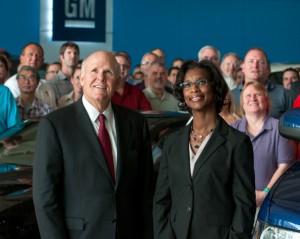
GM continues to increase the diversity of its senior management with the appointment of Alicia Boler-Davis as the head of manufacturing and labor relations.
General Motors made headlines and entered the record books when, in late 2013, it appointed Mary Barra as the first female CEO of a major automotive manufacturer. Now, Alicia Boler-Davis has crashed into the traditional, male-dominated auto industry club.
The 47-year-old GM veteran sets a few records of her own, in fact. She will become not only the first woman to direct the automaker’s manufacturing and labor relations operations, but also the first African-American. And she appears to be the first in such a position at any automotive manufacturer, as well.
“With all the change facing our industry in the next several years, Alicia’s vast and diverse experience and proven track record for delivering results will help ensure our global manufacturing performance and capabilities are aligned to meet the challenges ahead,” said GM CEO Barra in a statement.
Boler-Davis joined GM in 1994. She replaces 55-year-old veteran Jim DeLuca, who is retiring from GM after a 37-year career with the automaker. Under DeLuca, GM made numerous gains in both productivity and quality, and Boler-Davis will be closely watched, observers said, to see if she can maintain that momentum.
The auto industry has been a traditionally male-dominated bastion, women only fitfully making entry into senior roles in recent years. And, in many cases, they were shunted into what experts call “soft” management positions, such as public affairs and human relations.
(GM discussing fate of Canadian plant. For more, Click Here.)

Former GM Chairman Dan Akerson and Alicia Boler-Davis in her previous role as Senior Vice President Global Connected Customer Experience.
But there have begun to be signs of change, especially among Detroit makers. Clearly the most significant was the 2013 appointment of Barra as CEO – and her subsequent addition of the chairman’s title. A lifelong GM veteran, Barra replaced Dan Akerson, an industry outsider who came to GM following its run through bankruptcy during the Great Recession.
Women have also been gaining power outside the Motor City. Annette Winkler has been serving as CEO of Daimler AG’s Smart brand, for example.
Raised in Detroit, Boler-Davis has been serving as head of GM’s “connected customer experience” since November 2014, a position that had her overseeing the maker’s increasing focus on tech-based services, such as its OnStar operation, as well as interactive online efforts. She was previously in charge of quality and customer service.
But her roots are in engineering and manufacturing. She previously served as a vehicle line director and chief engineer for small cars. And, as one-time head of GM’s Arlington, Texas, plant, she became the first African-American woman to run a GM factory.
(GM CEO says autonomous vehicles should retain steering wheel, pedals. Click Here to read the story.)
In her new role, she will run an empire consisting of 171 facilities in 31 countries that employs about 180,000 blue and white-collar workers.
That is down substantially from the era when GM had more than 500,000 employees, most of them in North America. The maker has downsized substantially over the past three decades as its home market share has declined – and as it has pushed for dramatic productivity gains. Assembly plants that once required 5,000 line workers now roll out more vehicles with staffs of less than 2,000.
At the same time, what is now the world’s third-largest automaker has greatly expanded its presence overseas. It is the second-largest car manufacturer in China – and that is now a larger market for GM vehicles than is the U.S.
Boler-Davis will face a number of tests in her new role. She will not only have to continue boosting productivity and quality at GM plants, but she will likely play a key role as the automaker approaches its next round of quadrennial contract talks with the United Auto Workers Union in 2019.
(To see more about GM hitting a diversity milestone, Click Here.)
The UAW made major concessions during the recession that helped GM in its emergence from bankruptcy. But the automaker – like Ford and Fiat Chrysler – gave back some of those concessions last year. Both sides will be under pressure to ensure that GM does not lose its financial competitiveness against foreign-based rivals.
